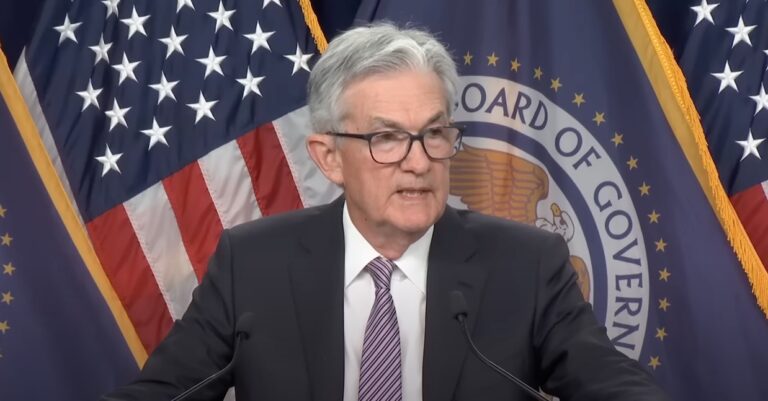In a revealing interview with CBS’s weekly news program “60 Minutes” that was aired yesterday, Federal Reserve Chair Jerome Powell provided a comprehensive overview of his approach to managing inflation, the health of the economy, and the future direction of interest rates. Conducted by correspondent Scott Pelley, the conversation shed light on Powell’s strategies to steer the economy through turbulent times without precipitating a recession, despite the Fed’s aggressive rate hikes.
Powell began by acknowledging the significant progress made in reducing inflation from its peak, but he cautioned that the job is far from over. The Fed’s goal is to fully restore price stability, and while inflation has been on a downward trend for 11 months, Powell emphasized the importance of proceeding cautiously before considering rate cuts. He argued for the need to see more evidence that inflation is sustainably moving towards the Fed’s 2% target before taking any steps to lower interest rates.
The Fed Chair explained the rationale behind setting a 2% inflation target, highlighting its role in providing the central bank with more leeway to combat economic downturns. Powell clarified that reaching the 2% mark is not a prerequisite for rate reductions, but he stressed the need for confidence that inflation is on a downward trajectory.
During the interview, Powell addressed the delicate balance the Fed must maintain between acting too soon, which could halt progress on inflation, and moving too late, potentially leading to a recession. He admitted that, in hindsight, the Fed could have responded more quickly to inflationary pressures in 2021 but defended the subsequent policy adjustments that have contributed to the current easing of inflation.
Looking ahead, Powell indicated that a rate cut in the near term, specifically by the March meeting, is unlikely, suggesting that the Fed’s confidence in the inflation trajectory needs more time to solidify. However, he expressed optimism that conditions for rate reductions could be met within the year, contingent on continued positive inflation data.
Powell also touched on the broader economic impacts of the pandemic, including the unique dynamics that fueled inflation and the subsequent adjustments that have helped moderate price increases. He reflected on his tenure as Fed Chair, appointed by Presidents Obama, Trump, and retained by Biden, emphasizing his commitment to steering the economy through its current challenges without political influence.
Addressing concerns about the banking sector, Powell downplayed the likelihood of a widespread banking crisis, attributing confidence in the resilience of the banking system despite challenges posed by the pandemic, such as the declining value of commercial real estate.
The interview concluded with Powell’s perspective on the national debt and the long-term fiscal sustainability of the U.S. economy. He underscored the importance of addressing the growing debt to ensure future generations are not burdened by current fiscal policies.
Here are some of the most compelling quotes from Powell, offering a glimpse into the mind of the man steering the U.S. monetary policy:
- On Inflation’s Current State: “Inflation has come down really over the past year and fairly sharply over the past six months… We’re making good progress. The job is not done, and we’re very much committed to making sure that we fully restore price stability for the benefit of the public.”
- On Interest Rates: “We want to see more evidence that inflation is moving sustainably down to 2%… We just want some more confidence before we take that very important step of beginning to cut interest rates.”
- On the Fed’s Inflation Target: “Interest rates always include an estimate of future inflation… That means you’ll have 2% more that you can cut in your interest rates. The central bank will have more ammunition, more power to fight a downturn if rates are a little bit higher.”
- On the Timing of Rate Cuts: “It’s not likely that this committee will reach that level of confidence in time for the March meeting… Almost all of the 19 participants believe that it will be appropriate in their most likely case for us to cut the federal funds rate this year.”
- On the Economy’s Resilience: “When rates went up, the economy added more than five million jobs… That’s because of the odd dynamics of the pandemic.”
- On Recognizing Inflation: “In hindsight, it would have been better to have tightened policy earlier… It’s essential that we did that, and that’s part of the story why inflation’s coming down now.”
- On the Health of Banks: “I don’t think there’s much risk of a repeat of 2008… Certainly, there will be some banks that have to be closed or merged out of existence.”
- On the National Debt: “The U.S. is on an unsustainable fiscal path… We’re borrowing from future generations. It’s time for us to get back to putting a priority on fiscal sustainability.”
- On Politics and the Fed’s Decisions: “We do not consider politics in our decisions. We never have, and we never will… Integrity is priceless, and at the end, that’s all you have.”
During a conversation on Fox Business program “Mornings With Maria” with host Maria Bartiromo, former U.S. president Donald Trump voiced doubts regarding Powell’s capability to navigate the economy to a “soft landing.” Trump speculated that Powell could reduce interest rates to benefit the Democratic Party in future elections, a move he believes could trigger significant inflation, particularly if tensions in the Middle East worsen and impact oil prices. He directly criticized Powell for being partisan and stated that he would not nominate Powell for a second term as Fed Chairman should he re-enter the White House, alluding to considering alternative candidates for the role without specifying any.









